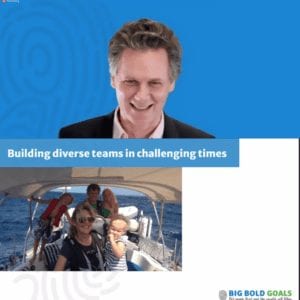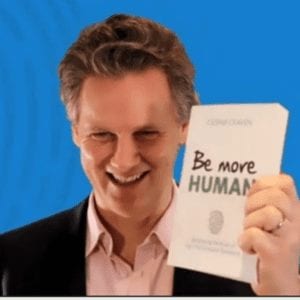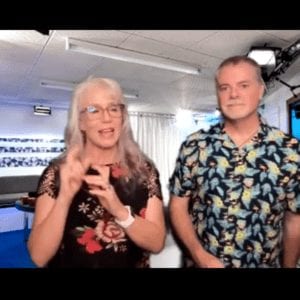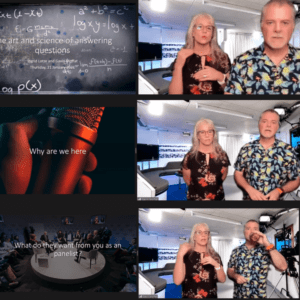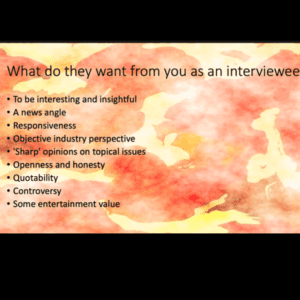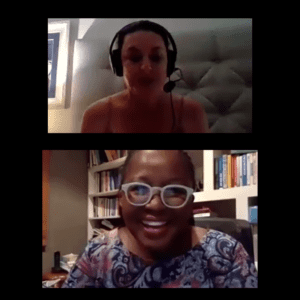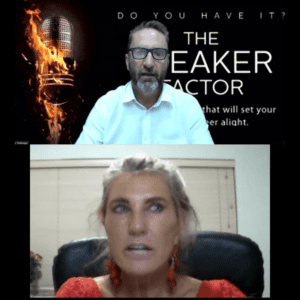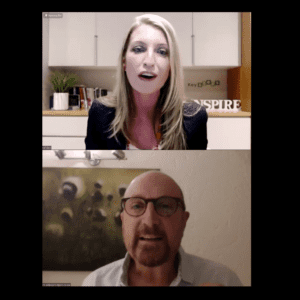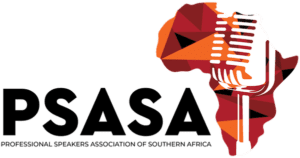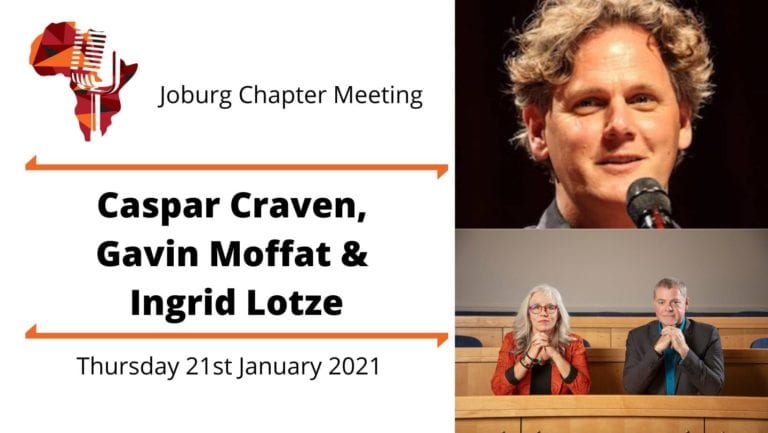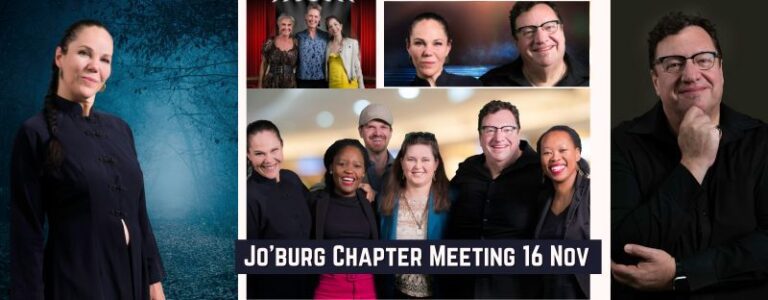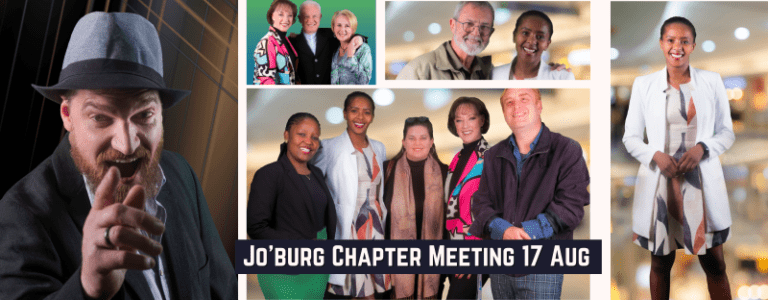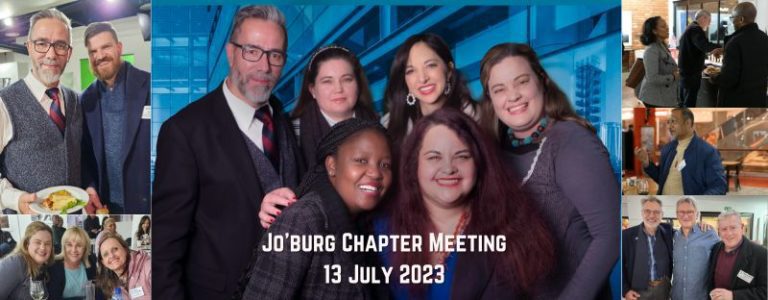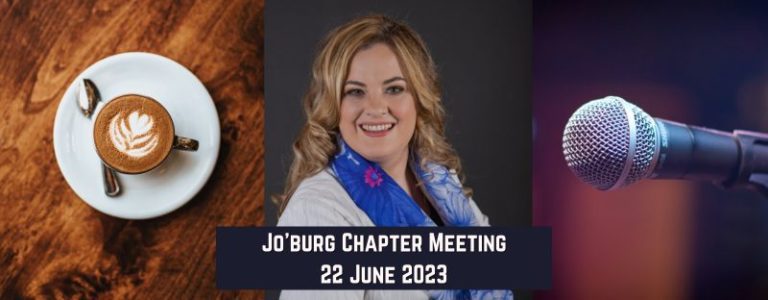Have you ever bombed in a media interview or a panel discussion?
Leigh-Joy Mansell-Pleydell warmly introduced Gavin & Ingrid Moffat as our first speaking slot on Thursday evening at the Johannesburg PSASA with a crowd of 38. They treated us to a mini media training. Here are a few nuggets of wisdom from their session: Always have a new and interesting angle. Make sure that you do research and ask the following questions before saying yes to an interview.
- Who is the audience?
- What are their hot buttons?
- How long will the interview be?
- What is the topic?
- Are there some questions that I can have to prepare?
- Is there something specific that you want me to cover? Or can you identify your own niche or focus area for the interview?
- Ask yourself: why me, and why now?
- Who is the journalist, what is their style, can you review some of their previous work?
If you are appearing on a panel, ask: “Who else is on the panel” and decide what area you will focus on. Gavin recommends that you practice the interview preferably with a group of people. He says to get a group together and find the hardest questions they could possibly ask you and practice those. Record it and give each other feedback. Make sure to find the key messages that you want to say. He recalled a radio interview, where he completely forgot to mention the name of his brand-new book that was published just that week. Make sure that you don’t just have a good time, but that you focus on the areas that you want to be known for. Have a core intention and fight for your voice.
Make sure to do this prep work:
- What do I want them to remember afterward?
- Relate this to the interview or panel discussions.
- Give them facts, figures, stats, and quotes to answer your questions.
Do these things:
- Introduce yourself, give context and scenarios.
- Tell a story that illustrates your points.
- Pose professional questions.
- Speak in sound bites, make it quotable so that it can be used.
- You can ask questions back if you don’t understand their questions.
- Don’t be afraid to talk over people to bring your point home.
- Ask the chairman if you want to make a point.
- You are welcome to contradict someone.
Don’t do this:
- “Never answer questions that you don’t have the answers to”
- “Never lie or exaggerate” or lose your temper.”
- Don’t be rude or submissive.
- Be authentic.
- Don’t be fixated on the question, if you want to redirect the question say: “The bigger issue here is”, “I think what is interesting for us to understand right now”- this is a well-known technique that Bill Gates uses to bring his core messages home.
- Don’t pitch your products.
When answering questions feel free to stop, breathe and think. You can repeat the question back to buy yourself time and to make sure that you understand it fully. Listen to the entire question and also at the tone of voice of the interviewer/reporter, and what they actually mean by the question. If you want to divert a question, use a phrase like: “What I want to focus on right now is.” Sometimes you may need to interrupt someone, especially if you run the panel or are doing the interviewing. Use this phrase: “Can I interrupt you, what it sounds like you are saying is this…”
Phrases to pull the attention back from an audience member who is taking over:
- “Can I pause you right there, can we just have your question”.
- “I think that’s a wonderful point, can I add to what you are saying.”
Ingrid says in order to get the MC’s attention and to show that you want to speak simply raise your arm to the MC, sit forward in your chair or move your body forward and they will know that you want to speak. If you want to increase your media presence they are running a 3-hour course with 10 seats available, you can find the details here: How will Media Skills Training benefit you? The training will allow you to:
- Practice your media skills in a safe environment under the guidance of highly experienced reputation management consultants
- Fine-tune your core message ensuring that they are contextually relevant for today’s environment
- Advance your communication, influencing, and interview skills to become a more effective leader and speaker
- Improve your critical thinking abilities by practicing being in a Q&A situation and asking the right questions, making decisions on what to say on the fly, and contextualising your role in the interview
- Pursue opportunities for interview excellence
- Practice in a confidential, peer-reviewed space and receive input on how you and your messages land and impact others
Date: Tuesday, 23 February 2021 Time: 08:30 to 12:30 Cost: R1 100 per person Limited to 10 people only Platform: Zoom More info: [email protected]
Brenda Kubheka thanked Gavin & Ingrid for their illuminating & practical experiential session and it was clear from the feedback in the chat room that members found it invaluable.
Dr Sharon King Gabrieldes, CSP, welcomed our international speaker, Caspar Craven by citing some of his adventures & how honoured we were to have a speaker of his calibre. She said he is sought after all over the world as a speaker, not just for his wild adventures but for the deep truths he has uncovered in his journey of “Becoming More Human.” We were delighted that Caspar Craven visited the Johannesburg Chapter again, after delivering a Keynote at our Convention in 2019.
Caspar’s book “Be More Human” is the core message of his work right now. Caspar realized he wasn’t happy with his life. His marriage was on the rocks, he & his wife were like ships sailing past each other in the night. He was working 16 – 18 hour days and they were awake & sleeping at different times. This lack of sleep and connecting lead to a passive-aggressiveness that eventually fed into his work life. Caspar’s dream of sailing around the world seemed unrealistic. How could he afford a sailboat, support his family for 2 years, when his business was failing, and he couldn’t even afford a rowboat? So, he went on a course in America. All fired up he came back ready to implement the turnaround strategies in his business, only to find that no one wanted to work with him anymore.
A manager pulled him aside and said “Everyone is unhappy,” if you do not change, we will all leave your business. Do you remember those times in school, when your friends didn’t choose you to be a part of their team in a ball sport? Caspar needed to change, and the African proverb spoke to him “You can go fast alone but will go further together.” Caspar applied principles of “Being Human” to his company and family and 5 years later left for his adventures on a sailboat. Now he teaches companies to focus first on their people and the numbers will follow. When businesses get out of lockdown & move back to the old or new normal, will people go back to being less human, focusing on profits rather than people, Like they were doing in the ’90s? Keep on asking yourself “What would a real person do in this situation?” While homeschooling Columbus, his son, he quickly realized that workbooks & online programs on history were not the best way to getting Columbus to study. He asked him “What do you enjoy?” “Fishing”. Fishing became the framework for all studies leading to biology (dissecting), maths (measuring), and language (talking) which allowed Columbus’ creativity to thrive.
You can apply this principle in your business by asking people”
- Why are you here?
- What are you interested in?
- What do you love doing?
- How can you do more of this work?
Get your teams to do the work they love doing.
3 principles from Caspar’s book are:
- What can you do to put people first? Know that your teams have personal lives and if they don’t resolve those issues they will carry that into the workspace. Get to a place where your teams can share about their personal lives too.
- Building trust: Create a space where your teams can feel safe. Ask their input and don’t be military-minded where none of their opinions count. Allow them to also give you solutions. Ask your team: “What builds trust in this team and what erodes it?”
- Listen deeply: Listen to what the person is saying and also what they aren’t saying.
Al Prodgers thanked Caspar for his remarkable & thought-provoking session, highlighting that “When we become a better human, the numbers will follow.”
SPECIAL EVENT: 11 February 2021 9 am: How did you do that? BOOK NOW
Please remember that we will be having a special Valentine’s meeting, with the legendary: Leanne Hughes, on the 11th February 2021, at 9am -11am. You can book your tickets here In this 57-minute think-do-reflect workshop, Leanne Hughes will share some of her favourite virtual engagement strategies she’s used from her spare bedroom in Brisbane, Australia, to audiences all around the world. She’ll teach you how you can do it, too!
In this workshop, you’ll learn:
- The #1 thing you need to have front of mind, to create an impact at your virtual session (Spoiler alert: It’s not your content)
- 5 new activities you can implement at your very next virtual workshop
- How to weave exciting free tech tools into your workshop delivery
- Tips to segment time chunks, leading to more audience involvement (with very little extra effort from your end!)
This will be a special event hosted by the Jhb chapter. You can book your tickets here We hope to see you, your friends and your colleagues at this incredible event, only 100 seats available
Do you have what it takes, to become the next Speaker Factor Champion? The Johannesburg Chapter heat of The Speaker Factor, the PSASA speaking competition for Associate Members will take place at our monthly meeting on Thursday 18th February (which will be on-line). To be eligible, you need to be a paid-up Associate Member of the PSASA in good standing. Participants are required to prepare and present a compelling five-minute speech to showcase your talent – a short version of something you would deliver for a client – without using slides or visual aids.
Judges will be looking at: Stagecraft/screen craft (20%); Script (20%); Delivery (20%); Bookability (40%) – would an audience pay for this? The top two contestants from the Chapter Heat will go on to represent us in the Semi-final which will be held as part of the PSASA Annual Convention which will be held from 16-18th April. The overall winner, will not only receive a major boost to their speaking career but will have the opportunity to present a keynote speech at the PSASA Annual Convention in 2022. If you would like to participate or would like further details, please contact Gary Tintinger [email protected] (the winner of last year’s Speaker Factor competition and coordinator of the 2021 Johannesburg heat) by 1st February at the latest.
Written by Yoke van Dam.
